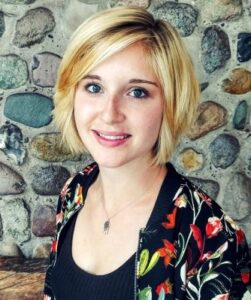Monitoring in people with early dementia
| Netherlands | |
| Early Stage Researcher (ESR9)
Sara Bartels |
Supervisor(s)
Prof. Frans Verhey
Prof. Marjolein de Vugt |
| Sara Laureen Bartels graduated in Psychology (2014) at the Medical School Hamburg, Germany, following a specialization in Neuropsychology (MSc) at Maastricht University, where she graduated cum laude in 2016. Additionally, she gained clinical and research experiences in Cologne and Aachen, Germany, as well as in Oxford, UK.
As an Early Stage Researcher, Sara will work at Maastricht University, the Netherlands, under the supervision of Professor Frans Verhey and Dr Marjolein de Vugt. Her project focusses on ‘E-monitoring in people with early dementia’ and aims to promote meaningful activities in people living with dementia. Her research interests include dementia, psychosocial interventions, experience sampling and e-health technology. |
|
| Start date | September 2016 |
| Duration | 36 months |
Objectives
In the current project we will use the Psymate technology to increase resources of people with very early signs of dementia to evaluate: (a) momentary assessment technology for capturing momentary activities, social context and related positive/negative affect in daily life. (b) real-time delivery of an existing therapeutic programme by integrating the momentary assessment technology in daily life during the therapeutic process. Technological innovations offer new opportunities to monitor subtle changes and fluctuations in everyday cognitive, behavioural and emotional functioning using momentary assessment technology to capture momentary functioning in the flow of daily life. In a previous project we used an electronic device (Psymate) to assess caregiver functioning in daily life and to generate personally tailored feedback on daily patterns of activities, context and emotions. Feedback was aimed to increase activities that generate positive emotions to build caregivers personal resources.
Expected Results
Adaptation and evaluation of momentary assessment technology for the target group will provide a much more detailed and vivid picture of functioning in daily life and offer new opportunities for real-time delivery of therapeutic interventions. Interaction with this technology offers the opportunity for persons with (very) mild signs of dementia to become active partners in the therapeutic process, resulting in greater patient ownership and empowerment as well as understanding of their functioning and the environment.
Planned secondment(s)
The ESR would benefit from a secondment to a (non-academic) partner who has opportunities to implement this innovative technology in everyday life with 3 months (M12-15) with Karolinska Institute (Sweden) to earn about how people with dementia relate to technology and the potential barriers and discrepancies faced by people with dementia dealing with technology. M24-M27 with the Betawerk digital engagement enterprise to learn about industry needs. Alzheimer Centrum Limburg has collaboration with Betawerk.
Dissemination
Publications
S. L. Bartels, S. Assander, A.-H. Patomella, J. Jamnadas-Khoda & C. Malinowsky (2019): Do you observe what I perceive? The relationship between two perspectives on the ability of people with cognitive impairments to use everyday technology, Aging & Mental Health https://doi.org/10.1080/13607863.2019.1609902
Sara Laureen Bartels, Rosalia J. M. van Knippenberg, Sebastian Köhler, Rudolf W. Ponds, Inez Myin-Germeys, Frans R. J. Verhey & Marjolein E. de Vugt (2019):
The necessity for sustainable intervention effects: lessons-learned from an experience sampling intervention for spousal carers of people with dementia, Aging & Mental Health, https://doi.org/10.1080/13607863.2019.1647130
Christie, H. L., Bartels, S. L., Boots L.M.M., Tange, H. J., Verhey, F.J. J., de Vugt, M.E. (2018) A systematic review on the implementation of eHealth interventions for informal caregivers of people with dementia. Internet Interventions, Vol. 13, Sept 2018, 51-59, DOI: https://doi.org/10.1016/j.invent.2018.07.002
Conferences
Bartels, S. L (2017, April) – INDUCT: Interdisciplinary Network for Dementia Using Current Technology. In WYLD Network Symposium – Interdisciplinary Perspectives: Young Investigators on the Road to a Holistic Approach to Dementia Prevention and Care. Symposium conducted at the 32nd International Conference of Alzheimer’s Disease International, Kyoto, JP – http://www.adi2017.org/docs/default-source/default-document-library/adi_kyoto2017_english_programmebook_online984553d4c06a60e6a166ff0000b1ca20.pdf?sfvrsn=0 – page 42
Bartels, S.L. (2017, October) – Follow-Up Results of the ‘Partner in Sight’ Caregiver Intervention based on the Experience Sampling Method. Alzheimer Europe Conference Berlin, Germany
Bartels, S.L. (2017, November) – The Necessity for Sustainable Intervention Effect in Dementia Research. Research Day at Maastricht University, Maastricht, the Netherlands
Bartels, S.L. (2017, November) – Long-term results of an mHealth Intervention for Dementia carers based on the Experience Sampling Method. Conference in Advances in Health Care Sciences Research, Karolinska Institute Stockholm, Sweden
Bartels, S.L. (2018, July) – Digital self-monitoring in People with MCI: Study Protocol and Preliminary results. Alzheimer Disease International, Chicago, USA
Bartels, S.L. (2018, September) – Study Protocol and Preliminary Results of the ‘Monitor-Mi’ Study: Experience Sampling in People with MCI. Neurofeedback and other Neuro-Technologies in Psychiatry, Maastricht, the Netherlands
Bartels, S.L. (2018, September) – Cognition in Everyday Life: A Validation Study. Neurofeedback and other Neuro-Technologies in Psychiatry, Maastricht, the Netherlands
Bartels, S.L. (2018, October) – The Comprehensive View: Combining Self-reports and Observations to Understand Everyday Technology Use of People with MCI and Dementia Alzheimer Europe Conference, Barcelona, Spain
Bartels, S.L. (2018, October) – Digital Self-Monitoring for People with Mild Cognitive Impairment: The ‘Monitor-Mi’ Study. Alzheimer Europe Conference, Barcelona, Spain
Websites
(Dutch only) Alzheimer Centrum Limburg – The ‘Montior-Mi Study’ https://www.alzheimercentrumlimburg.nl/2018-monitor-mi
Blog
WYLD Network blog – INTERDEM Masterclass: Would you like to participate in my study?- https://wyldementia.org/interdem-masterclass-would-you-like-to-participate-in-my-study/
News
INDUCT newsletter Winter 2017 – INDUCT Adventure – Far from boring – https://www.dementiainduct.eu/wp-content/uploads/2016/11/INDUCT-newsletter-Fall-Winter-2016_final.pdf – page 1
Alzheimer Centrum Limburg in beeld, February 2017 https://centraal.mumc.nl/sites/central/files/acl-nieuwsbrief6web.pdf – page 4
INDUCT newsletter Spring 2018 ‘Secondment of ESR 9 facilitates a sustainable collaboration between Maastricht University and Karolinska Institutet’, https://www.dementiainduct.eu/wp-content/uploads/2018/05/INDUCT-newsletter-Spring-2018.pdf – page 6

